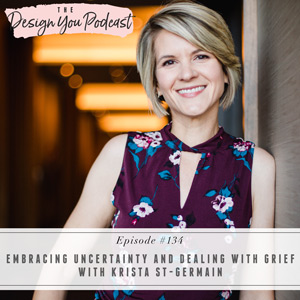
There’s a lot of uncertainty at present, and many of us are grieving all sorts of things. Whether it’s how life used to be, human interaction and relationships, or the loss of people in our lives. Today’s guest is here to show us how to cope with our feelings and the challenges we face amidst uncertainty, by focusing on what we can control rather than what we can’t.
Krista St-Germain is a Master Certified Life Coach, grief expert, widow, and mom. She is the host of The Widowed Mom Podcast and helps other widows figure out how to love life again, not in spite of their loss, but by using the loss as an opportunity to go forward and grow. She’s here to share some tips and tools to help you deal with grief, and explain how to use difficult circumstances as a catalyst to build a life you truly love.
Join us this week to learn more about what grief is, and why everybody’s experience with grief will be very different. We talk about why we should be kinder and less judgemental to ourselves and others, and why pain is part of the human experience but suffering is optional. Get out your notepad, friends, there’s so much to learn from this episode!
If you want to keep this conversation going, you have to join my free Design You Podcast community on Facebook. We have great conversations over there about the podcast episodes and our podcast guests are in there too! So head on over and I’ll see you there!





